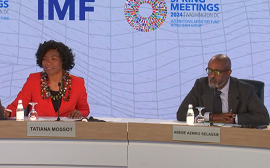By Andualem Sisay Gessesse, Washington DC – In the face of cost of borrowing increasing and official development assistance declining, the International Monetary Fund (IMF) advices Sub-Saharan African countries to make the right policy choices including domestic resource mobilization and reducing inflation.
This is indicated today Abebe Aemro Selassie African Department Director at IMF who presented the latest Regional Economic Outlook for sub-Saharan Africa on the sidelines of the IMF/World Bank Spring Meetings in Washington DC.
To address the challenges, the countries in the region need to improve public finances with domestic resource mobilization; focus on reducing inflation; and undertake reform on skills development, according to Mr. Abebe.
He noted that if the countries failed to make such policy choices, the countries will be forced to divert their limited resources to debt repayment, which will harm the economy livelihoods of their people. “The region is at a turning point. With the right policy choices this will be African century,” he said.
The report related to the outlook of Sub-Saharan African countries by IMF is also released this morning explaining in depth the issues raised by Mr. Abebe. Gross external financing needs for low-income countries in Sub-Saharan Africa is estimated to exceed $70 billion annually (6 percent of GDP) over the next four years, according to the report.
“As concessional resources have become scarcer, governments are seeking alternative financing options, which are typically associated with higher charges, less transparency, and shorter maturities,” it said.
“The cost of borrowing both domestic and external has increased and continues to be elevated for many. In 2023 government interest payments took up to 12 percent of its revenues (excluding grants) for the median Sub-Saharan African country, more than doubling from a decade ago. The private sector has also started to feel the pinch from higher interest rates.”

